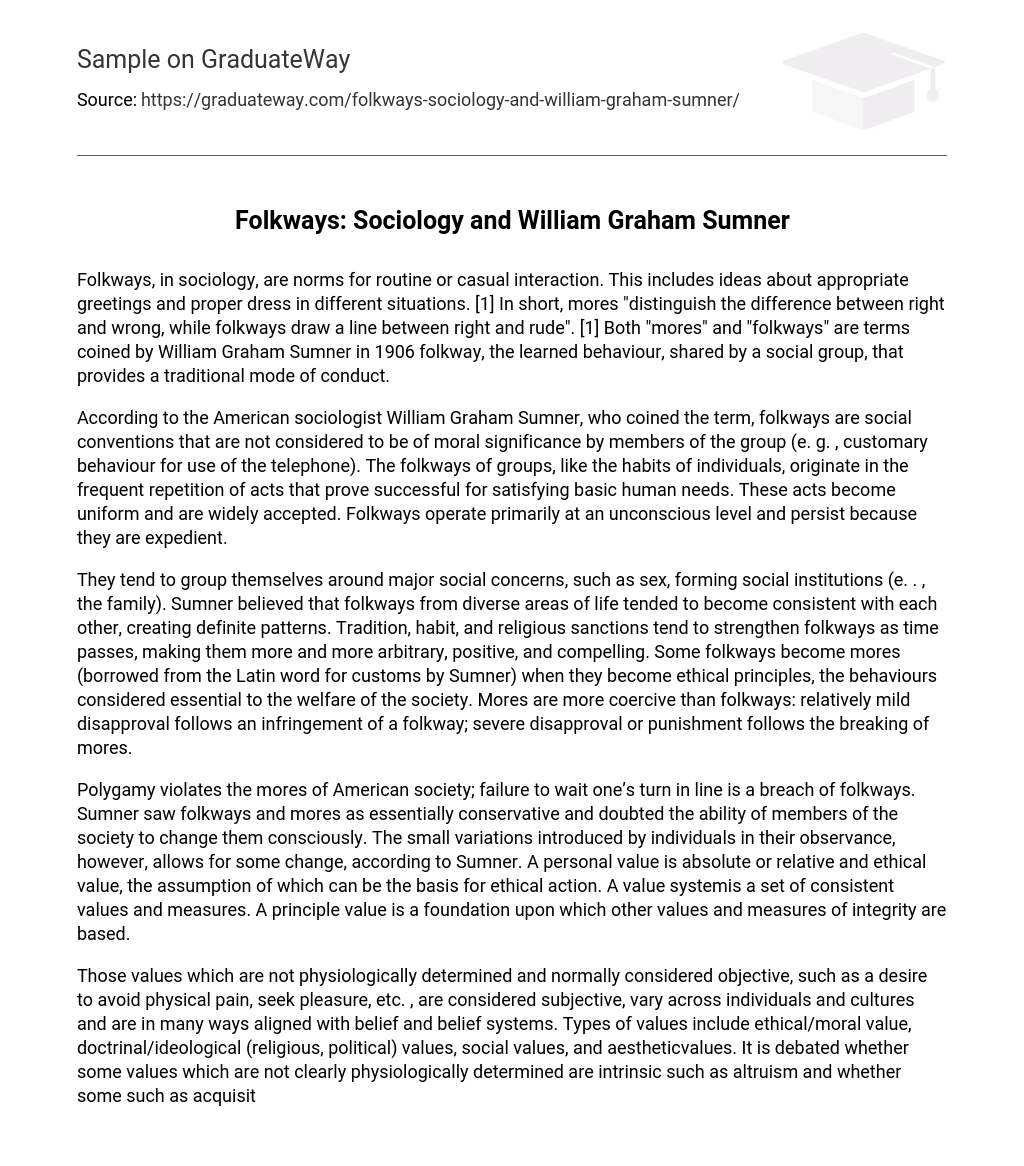Folkways, in sociology, are norms for routine or casual interaction. This includes ideas about appropriate greetings and proper dress in different situations. [1] In short, mores “distinguish the difference between right and wrong, while folkways draw a line between right and rude”. [1] Both “mores” and “folkways” are terms coined by William Graham Sumner in 1906 folkway, the learned behaviour, shared by a social group, that provides a traditional mode of conduct.
According to the American sociologist William Graham Sumner, who coined the term, folkways are social conventions that are not considered to be of moral significance by members of the group (e. g. , customary behaviour for use of the telephone). The folkways of groups, like the habits of individuals, originate in the frequent repetition of acts that prove successful for satisfying basic human needs. These acts become uniform and are widely accepted. Folkways operate primarily at an unconscious level and persist because they are expedient.
They tend to group themselves around major social concerns, such as sex, forming social institutions (e. . , the family). Sumner believed that folkways from diverse areas of life tended to become consistent with each other, creating definite patterns. Tradition, habit, and religious sanctions tend to strengthen folkways as time passes, making them more and more arbitrary, positive, and compelling. Some folkways become mores (borrowed from the Latin word for customs by Sumner) when they become ethical principles, the behaviours considered essential to the welfare of the society. Mores are more coercive than folkways: relatively mild disapproval follows an infringement of a folkway; severe disapproval or punishment follows the breaking of mores.
Polygamy violates the mores of American society; failure to wait one’s turn in line is a breach of folkways. Sumner saw folkways and mores as essentially conservative and doubted the ability of members of the society to change them consciously. The small variations introduced by individuals in their observance, however, allows for some change, according to Sumner. A personal value is absolute or relative and ethical value, the assumption of which can be the basis for ethical action. A value systemis a set of consistent values and measures. A principle value is a foundation upon which other values and measures of integrity are based.
Those values which are not physiologically determined and normally considered objective, such as a desire to avoid physical pain, seek pleasure, etc. , are considered subjective, vary across individuals and cultures and are in many ways aligned with belief and belief systems. Types of values include ethical/moral value, doctrinal/ideological (religious, political) values, social values, and aestheticvalues. It is debated whether some values which are not clearly physiologically determined are intrinsic such as altruism and whether some such as acquisitiveness should be valued as vices or virtues.
Values have typically been studied in sociology, anthropology,social psychology, moral philosophy, and business ethics. Enculturation is the process where the culture that is currently established teaches an individual the accepted norms and values of the culture or society where the individual lives. The individual can become an accepted member and fulfill the needed functions and roles of the group. Most importantly the individual knows and establishes a context of boundaries and accepted behavior that dictates what is acceptable and not acceptable within the framework of that society.
It teaches the individual their role within society as well as what is accepted behavior within that society and lifestyle” Norms affect the way one behaves in public. When one enters an elevator, it is expected that one turns around to face the doors. An example of a social norm violation would be to enter the elevator and remain facing the rest of the people. [19] The community has much to do with the development of social norms. [20] Although it is not illegal to not be courteous, it is a social norm.





